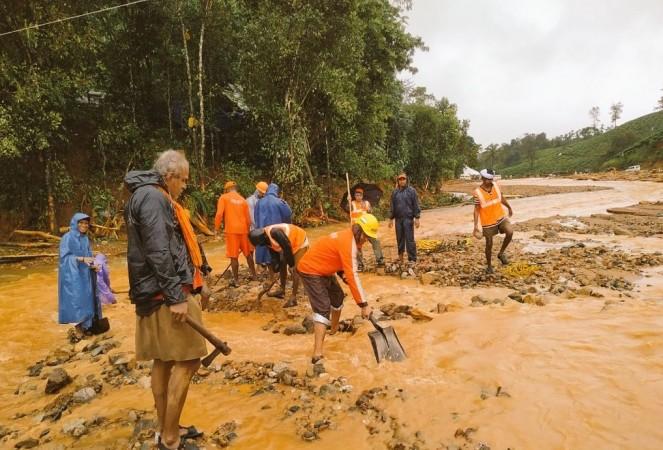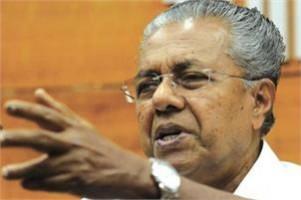
Has Kerala Chief minister Pinarayi Vijayan has lost the precious connect with the people that every democratically elected ruler should have? He has, and it hardly surprises anyone that Vijayan hasn't realised the bitter truth yet. From one laughable lapse to another, his rickety apple cart is chugging on. The Left leader, a prisoner of the time-warped Stalinist thought process, seems to be holding on to the belief that making Kerala a police state is the best route to suppress criticism.
The latest example is the widely carried out witch-hunt against mediamen, activists and social media users who criticised the government's handling of the disaster relief funds. The sloppy management of the flood disaster in 2018 had earned Vijayan and his government deeply rooted disaffection among Kerala's general public. The state survived the disaster because a highly socially aware and committed general public raised their game even as a the government machinery squarely failed.
However, what heightened the sense of betrayal of the Kerala public was the blatant misuse of the food relief funds that followed. General public, not just political opponents, vented their anger when a second flood havoc struck the state this month. However, Kerala's new police state had an easy way to smother criticism. File cases against social media users and media outlets that criticised the government.
"The cases have been registered for spreading false campaigns on the relief works and all such people would be arrested and proceeded against as per the law," State police chief Loknath Behera said after booking 19 people.
The swift police move came a day after Vijayan called whistleblowers and social media voices "anti-social elements."
Was the criticism false and motivated?

The Vijayan government loves to believe that the money and muscle power of the Marxist Communist Party give them the mandate to steamroller critics. The government floundered on many fronts when the flood disaster struck Kerala in 2018. The clueless government was in denial when hundreds died. When fair criticism mounted, the critics were easily termed villains and hunted down by the cyber wing of the Marxist party.
So, did the government misuse the Chief Minister's Disaster Relief Fund (CMDRF)? Yes, it did, multiple times, and brazenly. But if you say that aloud in Kerala your chief minister calls you an anti-social and his police would slap charges that attract imprisonment up to three years. That's so much for the party that preaches the virtues of freedom of expression and tolerance.
"CMDRF is an official system and the money received would be used for distress relief only... The fund is used for helping the poorest among the poor. All the allegations that the fund was being used for any other purpose is wrong," Vijayan said. He added that those who said otherwise were commiting the most "heinous crime" and should be locked up.
A lot of people in Kerala believe he was lying through the teeth. A look at incidents widely reported in the media will help. When CPI-M MLA KK Ramachandran Nair died, Vijayan's cabinet gave the family Rs 25 lakh from the Chief Minister's Disaster Relief Fund (CMDRF) in flagrant violation of norms. The disaster relief fund is not meant for paying off bank loans of party leaders.
In another blatant violation of norms the CM misused the disaster relief fund again by giving Rs 25 lakh to the family of Uzhavoor Vijayan, the state chief of NCP, an ally in the ruling coalition. An equal amount was doled out to the family of a CPM worker who was killed in an accident. Again, from the chief minister's disaster relief fund.
However, the most disastrous of the indiscretions was Vijayan's travel in a chartered helicopter to attend a party meeting using funds meant for disaster relief. The CM spent Rs 8 lakh from the State Disaster Response Fund (SDRF) on a chopper ride to attend a CPM meeting in February 2018. When the media reported it widely the government cancelled the original order.
In January 2019, the Kerala Lokayukta admitted a case against CM Vijayan and the state government over the misuse of the Chief Minister's Distress Relief Fund. The case before the Lokayukta was that the CM and ministers showed "favouritism" in giving hefty financial help to NCP leader late Uzhavoor Vijayan and former CPI(M) MLA K K Ramachandran Nair. The complaint also highlighted that Rs 25 lakh was allotted from the CMDRF to the family of a civil police officer who died in an accident while escorting CPM state secretary Kodiyeri Balakrishnan.
What is CMDRF?
As per rules, money from CMDRF can only be used for providing relief to people affected by natural calamities. If money is allotted for medical treatment then the beneficiary should be from below the poverty line. CMDRF is not a party fund that the CM can distribute as he pleases to his henchmen. But the CM's army of advisers failed to tell him that. And when the people said that on public channels they became anti social elements!
Fattening the cronies
Another disgraceful farce is the skewed priorities at the Rebuild Kerala Initiative (RKI), which was set up to coordinate flood relief efforts. Though basic relief hasn't reached tens of thousands of victims a year after the disaster struck, the RKI has gobbled up Rs 10 crore for its own establishment costs. The most shocking breach of public trust was the Vijayan government's decision to rent out a building owned by a party fellow traveller as office for the RKI and furnish it to the hilt.

The government is spending Rs 88.5 lakh from the RKI funds to furnish the rented property, the Times of India reported, citing an order issued by the planning and economic affairs department. The building is right next to the state secretariat. It's not as if government buildings can't be found in the capital city to run the RKI office from. But it's clear that the government is hell bent on fattening its cronies in the name of flood relief.
The money in the CMDRF is the sum total of the contributions, large and small, from people everywhere in the world who wanted to help the flood-hit state. This government breached the trust element underlying a disaster relief contribution. But those who questioned it, and aired concerns over the intentions of the government, were booked under Section 118 B and 120 O of the Kerala Police Act.
Section 118 B of Police Act against critics
Section 118 B provides for "imprisonment for a term which may extend to three years or with fine not exceeding ten thousand rupees or with both" for the offence of " knowingly spreads rumours or gives false alarm to mislead the police, fire brigade or any other essential service".
Section 120 O stipulates punishment of up to one year for "causing, through any means of communication, a nuisance of himself to any person by repeated or undesirable or anonymous call, letter, writing, message, e-mail or through a messenger."
These case just show the audacity and brazenness of the government. Raise your voice against incompetence, corruption and nepotism, the cyber coolies will bury you under a sleaze load first and then the police will hunt you down.
It's a pity that a communist government in Kerala is stooping so low to protect its image. Perception management, Stalinist style?
(The author is Managing Editor, International Business Times, India. Views are personal. Reach the author at j.jacob@ibtimes.co.in)

















